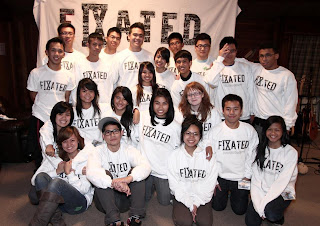Question: For both (or either) Adam Curtis and Sigmund Freud, is it possible to be happy? Why?
I have always been a firm believer that happiness is a choice. I have also been a big believer in the fact that although we don't always have control over our circumstances, we have control over our attitude towards them and ultimately, control over our own happiness and unhappiness. However, watching Adam Curtis' depiction of humans as "happiness machines" and reading Freud's strong sentiments regarding civilization and our many discontents does make me think. Is it possible to be truly happy? Why or why not? To some degree, I don't think that Curtis and Freud find it possible to be happy. Or at least, not for long.
Both Curtis and Freud emphasized that humans are driven by the "pleasure principle". We want to do things that'll make us happy. And we want to avoid all situations that'll make us unhappy. And it's very true. For example, if we buy a burger (random example) that we've been craving for a while, we're happy. But let's say we wanted to buy a milkshake to go along with that. If we didn't have enough money to afford it, we can't deny that we'd probably experience a slight feeling of dejection or sadness. Perhaps this isn't a very good example. Ultimately, their point is that in spite of how much happiness we "attain", there will always be some reason why we will find ourselves unhappy.
Freud says that one of the biggest reasons why we find ourselves "discontent" are because of the rules and regulations instilled by society. For example, we can't totally satisfy our sexual desires all the time because there are many reasons as to why it could be dangerous and it could also make us look like animals. And as people, we do fear looking bad to others, and it does make us unhappy. Also, if someone did something to upset us, it is frowned upon to justify it through violence. No matter how much resentment or anger we might feel, we are discouraged to act upon those feelings because it is wrong. Does that make it right? Does that mean we are truly unhappy because we can't act upon these instinctual feelings? Maybe what Freud and Curtis mean is that we're not always going to be ecstatic, peppy human beings because we won't always get what we want. The question may not even be whether it is possible to be happy, but do we really know what we want? I don't even know if Freud and Curtis have the answer to that.
It's funny because I think the reason why Freud and Curtis think that we as human beings will never be happy (to some extent) is because there will never be a time when we will have exactly what we want. At the same time, I don't think we as people will ever know exactly what we want, other than to be happy.
I think that Freud and Curtis are realists in the sense that maybe they believe that happiness is shortlived. But I think it's too presumptuous to say that they don't believe it's possible at all.
“Life is about not knowing, having to change, taking the moment and making the best of it, without knowing what's going to happen next.”- Gilda Radner
Monday 24 October 2011
Monday 10 October 2011
Compliance: Abundance vs. Scarcity
Question: Do you think Socrates is a man who is willing to die for his personal and philosophical beliefs, or do you consider him to be 'playing' the martyr figure in the extreme sense? The former has connotations of personal conviction whereas the martyr-figure, in this instance, to quote a nearby dictionary (Apple's), is "a person who displays or exaggerates their discomfort or distress in order to obtain sympathy or admiration." Can we separate the two?
Upon reading this question, I found myself intrigued by Apple's dictionary of a martyr. As far as I was concerned, and according to the Webster's New Dictionary which was conveniently situated beside my computer, a martyr is "one who chooses to suffer or die for one's faith or principles". I believe that there is a fine line between being giving for the sake of giving and giving to receive. Taking my belief and both of these definitions into account, I strongly find Socrates to be a man who is willing to die for his personal and philosophical beliefs.
Socrates was a man who believed that an “unexamined life is not worth living” (45). He committed his whole life to interrogating people to filter out the truth in their statements as so to teach people to be wise, reasonable and just. He did this because he said that he was once given an oracle by Chaerephon, the god of Delphi, that he was the wisest of men. Trying to prove this to the poets, artisans, and politicians of Athens wasn’t beneficial to him since it jeopardized his relationship with the state. It wasn’t like Socrates benefited financially from these cross-examinations either because he lived in poverty even until the time of his death. He was also considered to be a corruptor of youth. “Corruptor of youth”… Ouch. If obtaining sympathy or admiration was the objective, Socrates clearly wasn’t successful.
Socrates also recognized that his ideas to promote justice didn’t always sit well with the majority. According to Socrates himself, "There is no man who will preserve his life for long, either in Athens or elsewhere, if he firmly opposes the multitude, and tries to prevent the commission of much injustice and illegality in the state"(38). Knowing that his life was at stake while continuing to refute others for the sake of proving what is just exemplifies that Socrates valued the truth over other’s opinions of him. Furthermore, he valued the truth at the expense of his own life. What a guy.
The biggest reason I believe that Socrates can be defined as someone convicted in his own beliefs even to the point of death is because of his eagerness to accept his verdict by the law. Socrates had the option to renounce his beliefs or even submit to exile, but he declined out of integrity. He even refused Crito’s offer to help him escape out of prison just prior to his execution. Although he knew that he wasn’t guilty of his charges, he accepted his fate with understanding; understanding that he must always stand by what is just and that perhaps the gods had a better plan for him in the after-life.
Socrates remained an advocate of justice and true wisdom until the last seconds and at the expense of his life. He was the kind of man that expressed no discomfort or distress and sought no consolation in saying that “to fear death… is only to think ourselves wise without really being wise, for it is to think that we know what we do not know” (35).
Upon reading this question, I found myself intrigued by Apple's dictionary of a martyr. As far as I was concerned, and according to the Webster's New Dictionary which was conveniently situated beside my computer, a martyr is "one who chooses to suffer or die for one's faith or principles". I believe that there is a fine line between being giving for the sake of giving and giving to receive. Taking my belief and both of these definitions into account, I strongly find Socrates to be a man who is willing to die for his personal and philosophical beliefs.
Socrates was a man who believed that an “unexamined life is not worth living” (45). He committed his whole life to interrogating people to filter out the truth in their statements as so to teach people to be wise, reasonable and just. He did this because he said that he was once given an oracle by Chaerephon, the god of Delphi, that he was the wisest of men. Trying to prove this to the poets, artisans, and politicians of Athens wasn’t beneficial to him since it jeopardized his relationship with the state. It wasn’t like Socrates benefited financially from these cross-examinations either because he lived in poverty even until the time of his death. He was also considered to be a corruptor of youth. “Corruptor of youth”… Ouch. If obtaining sympathy or admiration was the objective, Socrates clearly wasn’t successful.
Socrates also recognized that his ideas to promote justice didn’t always sit well with the majority. According to Socrates himself, "There is no man who will preserve his life for long, either in Athens or elsewhere, if he firmly opposes the multitude, and tries to prevent the commission of much injustice and illegality in the state"(38). Knowing that his life was at stake while continuing to refute others for the sake of proving what is just exemplifies that Socrates valued the truth over other’s opinions of him. Furthermore, he valued the truth at the expense of his own life. What a guy.
Socrates remained an advocate of justice and true wisdom until the last seconds and at the expense of his life. He was the kind of man that expressed no discomfort or distress and sought no consolation in saying that “to fear death… is only to think ourselves wise without really being wise, for it is to think that we know what we do not know” (35).
Monday 3 October 2011
For nothing compares to You, my Saving Grace
My camp song :) Camp F[IX]ated, you will be in my heart forever.
Sunday 2 October 2011
Camp F[IX]ated Service Team
You guys exemplify that the beauty of the Lord is why Surrey 2 is called the "Surrey 2 Good Lookings". Thank you for saying yes to serving and for inspiring me to always fixate my eyes on Him. Because look at what beautiful things can occur when we do♥ Big thank you to the parent coordinators for being role models and inspirations!
Last but not least... God, you're sick. Thank You for everything.
#FIXATEEEED #So stacked #Mostswagcampever #Trollololololol
Sr. Select 2011-2012!!
My students<3 I adore every single one of these people. I can't wait to spend the year with them! :)
Subscribe to:
Posts (Atom)




